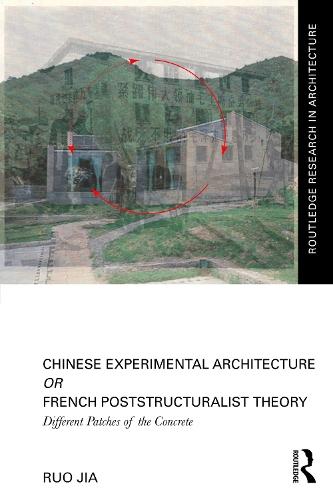Overview
Chinese Experimental Architecture Or French Poststructuralist Theory: Different Patches of the Concrete starts with a paradox: how the Chinese Cultural Revolution—through its adaptation by French Theory and French Theory’s subsequent adaptation by Chinese Experimental Architecture—shaped the Chinese reformative effort to redefine itself, amidst its struggle against colonial dynamics, and against the Cultural Revolution. Through French Poststructuralist Theory, the project creates a critical narrative to access the Chinese Experimental Architecture movement of the late 1990s and early 2000s and its legacy in contemporary Chinese architecture. At the same time, it provides, in retrospect, an opportunity to approach French Theory in its rich global materiality as a production of Chinese Experimental Architecture. This study thus overcomes simplistic dichotomies of dominant and subjugated, reductive labels of orientalism, self-orientalism, and nationalism, as well as architectural stylistic or operative canons. It opens such borders and enclosed entities in a positive way, exploring collaborative inquiries where new possibilities of different materialist architectural design and socio-eco-political epistemological structure emerge in a field of events, encounters, and connections around the problématique and signifier of the “concrete.”
Full Product Details
Author: Ruo Jia
Publisher: Taylor & Francis Ltd
Imprint: Routledge
ISBN: 9781032907321
ISBN 10: 1032907320
Pages: 266
Publication Date: 18 November 2025
Audience:
College/higher education
,
Professional and scholarly
,
Tertiary & Higher Education
,
Professional & Vocational
Format: Hardback
Publisher's Status: Forthcoming
Availability: Not yet available

This item is yet to be released. You can pre-order this item and we will dispatch it to you upon its release.
Reviews
“Relocating French Theory from Europe to China, and China back to Europe, Ruo Jia’s transcontinental account of Sino-French Poststructuralist Theory and Experimental Architecture is a major contribution to the potentialities of a feminist and decolonial future in these fields. Dispelling the Cold War’s conventional geospatial division between the East and the West, Jia deftly traces the international circuits of Global Maoism and French Theory, and most excitingly, the trans-disciplinary effects of their encounters that recoded the foundations of twentieth-century philosophy and architecture. It is a must-read for anyone interested in the architectural incarnations of poststructuralism, and the invisibilized place of Asia in co-forming twentieth-century critical theory.” Erin Y. Huang, Assistant Professor of East Asian Studie, University of Toronto. “Not only original in approach, but well-sustained in argument and hitherto unknown sources: a model of such research for future scholars.” Anthony Vidler, author of The Architectural Uncanny: Essays in the Modern Unhomely. “Ruo Jia opens thrilling insights on a singular moment of Chinese culture and intellectual development with her close readings of the complex and mediated forms of philosophical production traveling, as it does, from France to China to the Americas and back. Surprising but rigorously motivated intersections of seemingly incommensurate knowledge systems throw off sparks of inspiration for scholars and designers alike.” K. Michael Hays, Eliot Noyes Professor of Architecture Theory, Harvard University Graduate School of Design. “A meticulously documented account of the history of Chinese Experimental Architecture, whose engagement with French Maoism and post-structuralism is an intriguing instance of the discursive exchanges between European theory and Chinese modernity and postmodernity. Ruo Jia’s chronicle of the key players involved on both sides will be an invaluable resource to all those interested in the transcultural interpenetration of artistic conceptualization and artistic practice.” Rey Chow, author of A Face Drawn in Sand: Humanistic Inquiry and Foucault in the Present
“Relocating French Theory from Europe to China, and China back to Europe, Ruo Jia’s transcontinental account of Sino-French Poststructuralist Theory and Experimental Architecture is a major contribution to the potentialities of a feminist and decolonial future in these fields. Dispelling the Cold War’s conventional geospatial division between the East and the West, Jia deftly traces the international circuits of Global Maoism and French Theory, and most excitingly, the trans-disciplinary effects of their encounters that recoded the foundations of twentieth-century philosophy and architecture. It is a must-read for anyone interested in the architectural incarnations of poststructuralism, and the invisibilized place of Asia in co-forming twentieth-century critical theory.” Erin Y. Huang, Assistant Professor of East Asian Studie, University of Toronto. “Not only original in approach, but well-sustained in argument and hitherto unknown sources: a model of such research for future scholars.” Anthony Vidler, author of The Architectural Uncanny: Essays in the Modern Unhomely. “Ruo Jia opens thrilling insights on a singular moment of Chinese culture and intellectual development with her close readings of the complex and mediated forms of philosophical production traveling, as it does, from France to China to the Americas and back. Surprising but rigorously motivated intersections of seemingly incommensurate knowledge systems throw off sparks of inspiration for scholars and designers alike.” K. Michael Hays, Eliot Noyes Professor of Architecture Theory, Harvard University Graduate School of Design.
Author Information
Ruo Jia is an architect/artist/theorist/historian/educator. She founded and directs the research-based practice IfWorks, which explores art/architecture possibilities individually Or collectively. Her research into constructing a decolonizing postmodern materialist space through the interweaving of “Chinese Experimental Architecture” Or “French Poststructuralist Theory,” is being expanded to envision the possibilities of Asian Feminist Architecture and Posthumanist Sustainability. Her work has been published in the Journal of Architecture, Representations, Log, Brooklyn Rail, the Journal of Architectural Education, and e-flux among others. She holds a PhD in Architectural History and Theory from the Princeton University School of Architecture, with an interdisciplinary humanities certificate from Media+Modernity; an M.Arch.II from the Harvard University Graduate School of Design; and an M.Arch. and a B.Arch. from the Southeast University School of Architecture. Formerly a tenure-track Assistant Professor in History and Theory of Architecture and affiliated faculty at the Gender Studies Program at Mississippi State University, she has also taught at Pratt, Cornell, Harvard, CUNY, Columbia, and Princeton.



